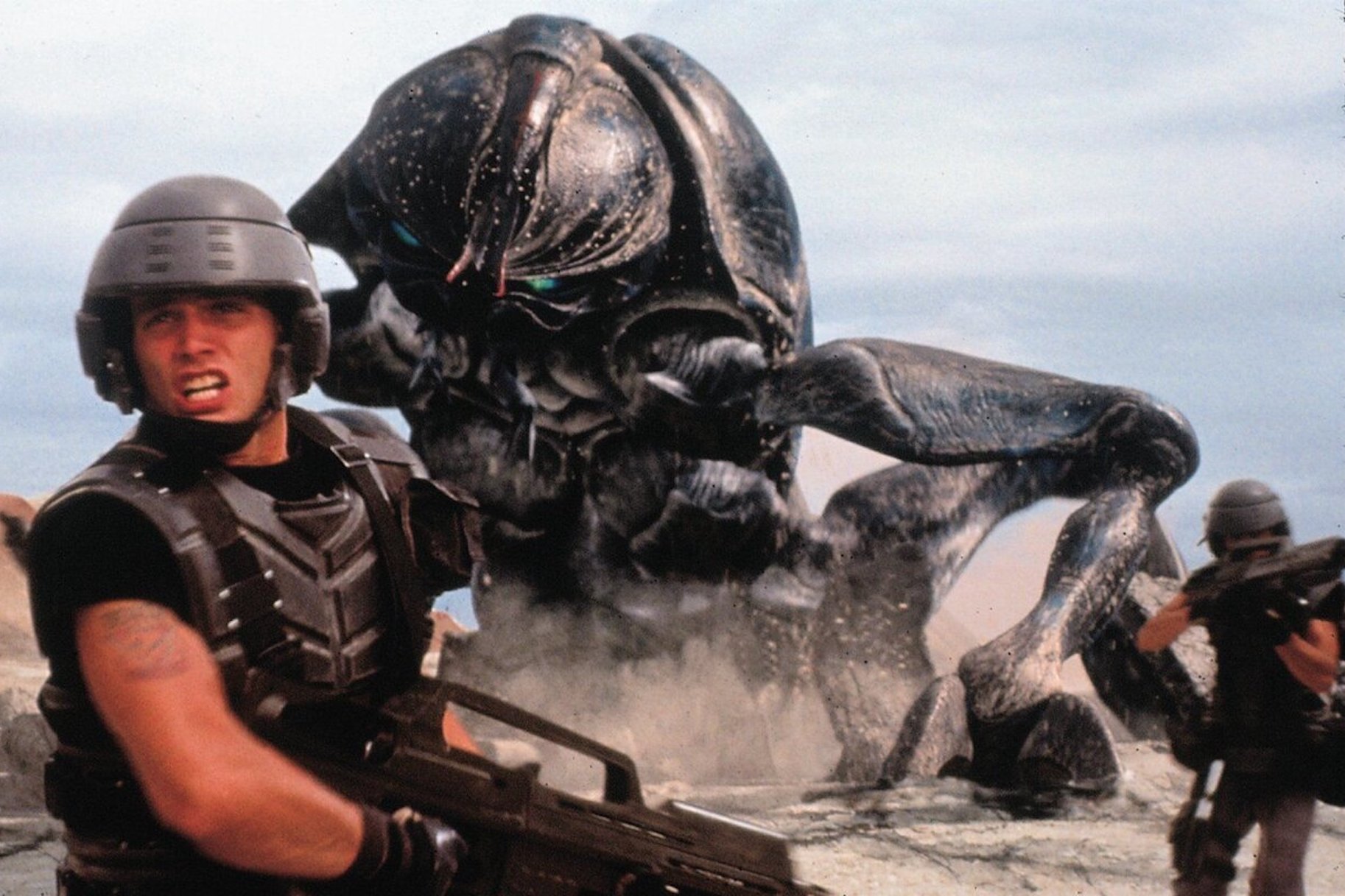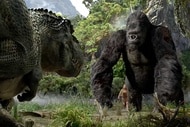Create a free profile to get unlimited access to exclusive videos, sweepstakes, and more!
Thank goodness people realized that 'Starship Troopers' is actually a masterpiece
Would you like to know more?

When Starship Troopers came out 25 years ago today, it bombed at the box office. The ruins of Buenos Aries after the Bugs destroyed it have nothing compared to what a critical and commercial bomb Starship Troopers was. Thank goodness that, a quarter-century later, society has come around and hailed Starship Troopers as a sci-fi classic. Perhaps more importantly, we’ve recognized the film for what it is: a brilliant piece of satire that’s so overtly anti-fascist and militaristic that it’s truly a wonder that people missed the point when it first came out.
To be marginally fair to the many, many critics who took Starship Troopers’ satire at face value, the book that it’s based on, Robert A. Heinlein’s 1959 novel of the same name, is indeed pretty fascistic. Luckily, director Paul Verhoeven hated the book, which he told Empire he stopped reading after two chapters because it was “very boring,” “quite bad” and “very right-wing.” Verhoeven, the director of RoboCop who clearly knew a thing or two about gritty sci-fi satire, realized he could use the book to undermine itself. He and writer Ed Neumeier turned what were originally earnest endorsements of militarism and valor into something uncanny and over-the-top. “All the way through I wanted the audience to be asking, 'Are these people crazy?” Verhoeven said.
Starship Troopers takes place in the 23rd century, in an era where Earth is ruled by a military government because foolish concepts like democracy and human rights had brought civilization to the brink (or so they claim) before iron-fisted fascists restored order. But, none of the characters in Starship Troopers — especially Casper Van Dien’s Johnny Rico, a perfect jock idiot — realize they live in a dystopian world. For one thing, it’s all they’ve ever known, and they’re comfortable enough. That we don’t see much of the lower classes or of this society’s problems is clearly not a suggestion that they don’t exist — they’re just suppressed, out of sight, out of mind.
WOULD YOU LIKE TO KNOW MORE? Starship Troopers was a bugged-out critique of fascism
And there is one big problem in Starship Troopers’ world: Bugs. Earth is at war with an alien race of giant bugs. Only those who serve in the military are granted the right to vote (and also breed, which is a whole other layer of messed-up), so naturally, there are lots of hot young men and women who eagerly go along with the propaganda and sign up to have their arms and legs blown off fighting alien bugs on the other side of the galaxy.
Starship Troopers is action-packed, with great creature special effects and some gnarly gore. It’s fun to watch the human vs. alien bug war, and you even root for our li'l fascist heroes, dumb as they are. They have a certain charisma and it’s easy to get caught up in wanting them to win the day against the bugs.
But, even if you’re rootin’ for Rico’s Roughnecks, you have to have such a narrow focus to think that the movie is actually endorsing or valorizing this war. In Starship Troopers, war isn’t just hell; war is stupid and pointless and the vast majority of people who charge into a war (of dubious origins and objectives) don’t come back. The tonal disconnect between how propaganda, and the people who have bought into that propaganda, talk about the fighting and the violence we actually see on screen is absurd. Clearly, this contrast is deliberate and is meant to make a point.
In perhaps the least-subtle sequence in the movie, a severely maimed army recruiter with no legs and a robotic arm happily tells Rico that Mobile Infantry “made him the man he is today.” It’s a dark joke — and an obvious one at that. It’s perhaps the key to understanding the entire worldview of this movie. It’s a glossy, militaristic dystopia but nobody seems to view that as a bad thing despite all the available evidence otherwise.
And yet, everybody seemed to miss the point. In his two-star review, the late great Roger Ebert complained that “the Bugs aren't important except as props for the interminable action scenes, and as an enemy to justify the film's quasi-fascist militarism.”
…Well, yes, Roger. That’s the point.
In more recent years, the outlandish nature of Starship Troopers’ satire has become grimly less outlandish. It’s common in critical circles to say the film predicted the Global War on Terror, which began four years after its release. At the peak of the GWOT, there wasn’t a lot of focus on the nuances of America’s “terrorist enemies” in mass culture. They were more like an enemy that justified quasi-fascist militarism, to borrow from Ebert.
That Starship Troopers is still relevant — perhaps more so than ever — 25 years after its release is certainly depressing. But, at least now it’s correctly hailed as a masterpiece. It’s a gory, thrilling, and dark look at how bad things can be without even knowing it.
Starship Troopers is streaming on Paramount+.
Looking for more sci-fi action? Stream tons of great movies on Peacock.


























